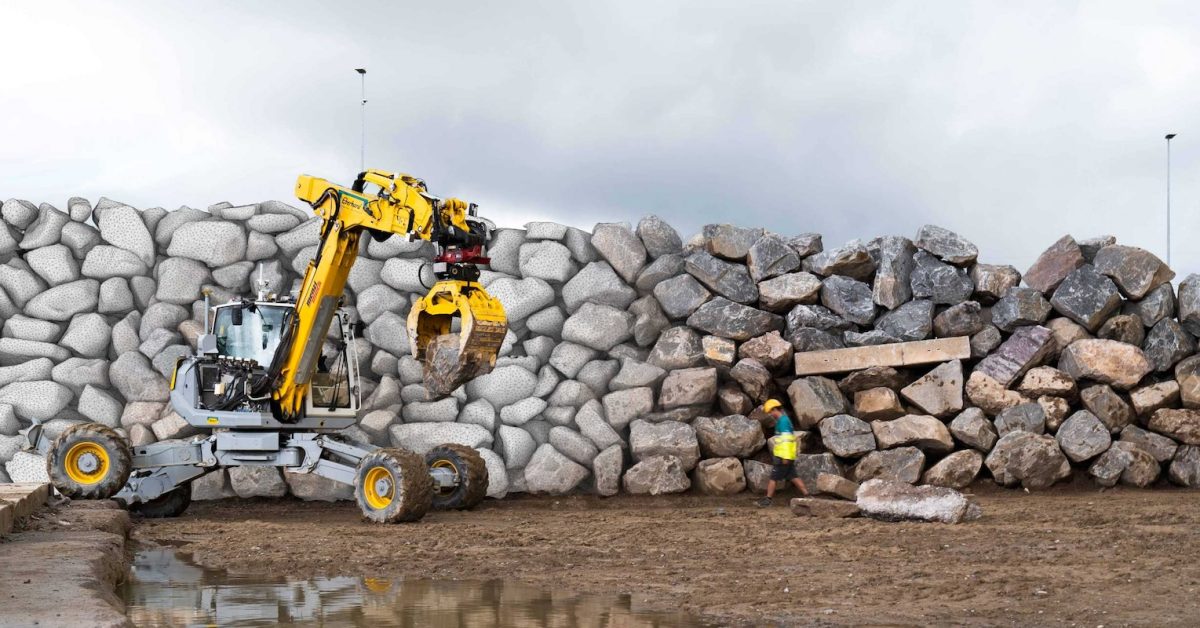so how long until it’s revealed that it’s actually remotely controlled by underpaid contractors in India?
Twitch plays wall building.
That’s the secret: in India, there’s no such thing as being underpaid
Set it loose and let it build a wall wherever it wants
I am Builder.Insert boulder.
This video gives a good look at what’s involved in building a stone retaining wall like this:
Essential Craftsman: How to stack a boulder wall
There’s a fair amount of practical expertise, like picking specific sizes/shapes for specific areas and arranging the rocks so they won’t move later (he talks about the long-term safety implications around 12:30). It’s a very involved moment-to-moment decision making process.
Just because the robot can fit the rocks together in a way that stands up now doesn’t mean it’s done so in a way that will be safe and stable five years from now, especially with the pressure of tons of dirt behind it, probably with a building on top of that.
Automation can replace human labor but it can’t replace human attention.
Funny you picked that video, because even with all that experience, they still messed it up.
It was mostly a miscommunication with the engineer, but still, the guy stacking the boulders never realized they wouldn’t be stable the original way it was done, with the support wall built the way it is.
No kidding, I hadn’t seen that one. If I understand correctly, the rocks were stable but the angle was putting too much pressure on the concrete wall which made it crack.
That’s what I understood from the video.
Here is an alternative Piped link(s):
https://piped.video/mG1meCTie1w
Piped is a privacy-respecting open-source alternative frontend to YouTube.
I’m open-source; check me out at GitHub.
Here is an alternative Piped link(s):
Essential Craftsman: How to stack a boulder wall
Piped is a privacy-respecting open-source alternative frontend to YouTube.
I’m open-source; check me out at GitHub.
Somewhere around here I have a 1960s or '70s Star Trek annual with a story where machines like this end up converting an entire planet into one enormous city, and the people that live there can’t stop it.
The story is basically a warning about turning everything over to AI, not that they call it that specifically.
Same idea as grey goo
Oddly enough, Spock solves the problem (because of course he does, and it’s a comic that has to be done in 30 panels or so) by discovering that the city construction materials can be chemically dissolved into goo. Thankfully not the sort that overtakes a planet.
… at least assuming there wasn’t a sequel.
Paperclip maximizer: Stone wall edition.
AI won’t take MY job, I’m safe. And I’m gonna go cry.
Everyone: “Construction and Creative jobs will probably be the last to be automated!”
Computer Scientists: And I took that personally
Well-defined, repetitive tasks are always the first to go.
Construction and “well-defined”? I mean, OK, most parts of construction of a whole new building maybe.
I dunno. I’ve seen some horror show construction screw ups done by regular ol’ humans.
Everything I’ve seen about construction was a horror show, but I live in Russia.
Right up until the first of hundreds of change orders.
I remember this from one or two months ago.
Yeah, I heard about it on a podcast a few weeks ago, but didn’t see a video until recently.
I wonder when they will automate billionaires?
That’s actually pretty cool. I’d like to see them use it to make a building.
This one is not made for buildings. It’s superpower is placing the boulders in a smart way, building a wall without using concrete.
No smooth surface, no paint job :)
Well…I bet that there’s some sort of buildings that use dry stone.
I think that there are old forts in Britain done like that. I was into looking at pictures of fortifications at one point.
googles
Brochs in Scotland:
https://en.wikipedia.org/wiki/Broch
In archaeology, a broch /brɒx/ is an Iron Age drystone hollow-walled structure found in Scotland. Brochs belong to the classification “complex Atlantic roundhouse” devised by Scottish archaeologists in the 1980s.
Brochs are roundhouse buildings found throughout Atlantic Scotland. The word broch is derived from the Lowland Scots ‘brough’, meaning fort. In the mid-19th century, Scottish antiquaries called brochs ‘burgs’, after Old Norse borg, with the same meaning. Brochs are often referred to as duns in the west, and they are the most spectacular of a complex class of buildings found in northern Scotland. There are approximately 571 candidate broch sites throughout the country, according to the Royal Commission on the Ancient and Historical Monuments of Scotland.
No, I get it, I just think it would be cool to build a structure that way. You’d have to fill in the gaps, but people made lots of buildings like that once upon a time.
Boulders for that may be more expensive than concrete and armature.






